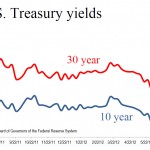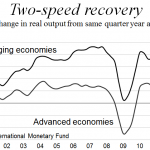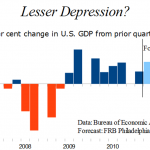Listen to the music of the bond market. That was the first of the bullet points that I presented to speaking clients last week. The song the global bond market is singing this week is the same as last week: Almost No Inflation, and Very Little Growth. Germany on February [continue reading . . . ]
A correspondent who heard my comments on Cyprus on KUOW’s Weekday program today asks: I am puzzled by some of your comments this morning. As I understand it, when a bank in the U.S. fails, the FDIC moves in and closes it. The accounts are protected by insurance up to [continue reading . . . ]

Interest rates on U.S. Treasury notes with a maturity of 10 years fell last month to nearly the lowest since World War II. They may go lower still. Today’s low rates reflect both the weak outlook for most advanced economies and a desperate scramble globally for safe places to park [continue reading . . . ]
Don’t miss today’s Heard on the Street item in the Wall Street Journal headlined “Central Banks Tilt at Global Windmills.” The item, by Richard Barley, notes that “the People’s Bank of China, the European Central Bank and the National Bank of Denmark all cut rates Thursday, and the Bank of [continue reading . . . ]
Stockton’s doing it. Greece has done it. Spain and Italy are on the cusp. How do they do it? Let me count the ways. Stockton, reports the Wall Street Journal (Review & Outlook, June 27, 2012), …has a little over $300 million in general-fund backed debt, but an $800 million [continue reading . . . ]
Martin Wolf, much-honored chief economics commentator of the Financial Times, has been my beacon during the financial crisis. So it is especially discouraging to read his June 6, 2012, column, headlined “Panic has become all too rational”. Wolf argues that the advanced economies are caught in a “contained depression,” that [continue reading . . . ]
Uh, oh. That’s what I find myself muttering these days when I fire up the news browser or open my morning papers. The economic news leaves me with a sense of dread. I find three developments especially worrisome: 1. Europe’s slow-motion economic crisis, now more than three years old, rumbles [continue reading . . . ]
The trouble with the French is that they are sick and tired of austerity, and they won’t take it any more. Oh, and by the way, they want it all. Big government, check. The French public sector accounts for more than half of the economy. Early retirement, check. Voters threw [continue reading . . . ]
“For Big Companies, Life is Good.” That was the headline on the Marketplace Section front page of the Wall Street Journal April 9. The item reported that sales, profits and employment of the largest American companies, the Standard and Poor’s 500, last year exceeded the highs reached before the Great [continue reading . . . ]

It has been nearly four years since the collapse of two Bear Stearns hedge funds (June 2007) signaled the start of the global financial crisis, not quite three since the failure of Lehman Brothers Holdings (Sept. 14, 2008) sent banks into a panic and pushed the tottering global economy off [continue reading . . . ]

What to call the period that arguably began in 2006 when the rich world’s housing market peaked? The Financial Times (FT) in a Lex column May 13 uses a term I have not seen before: “Lesser Depression.” The U.S. economy typically rebounds strongly following a recession. The 1974-75 and 1981-82 [continue reading . . . ]
So you think the dollar is washed up as a reserve currency, destined to live up to the jibe “American peso.” Better whip out your library card and retrieve the column of Mansoor Mohi-uddin, managing director of foreign-exchange strategy at UBS, on Page 22 of the Financial Times May 11, [continue reading . . . ]